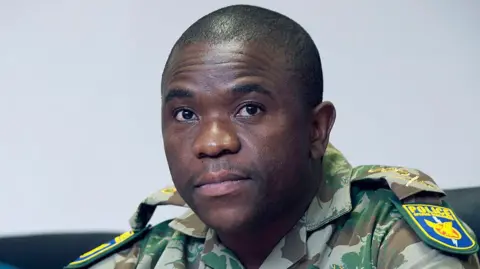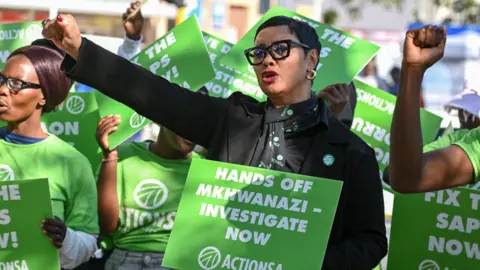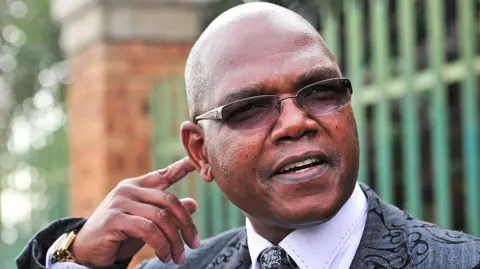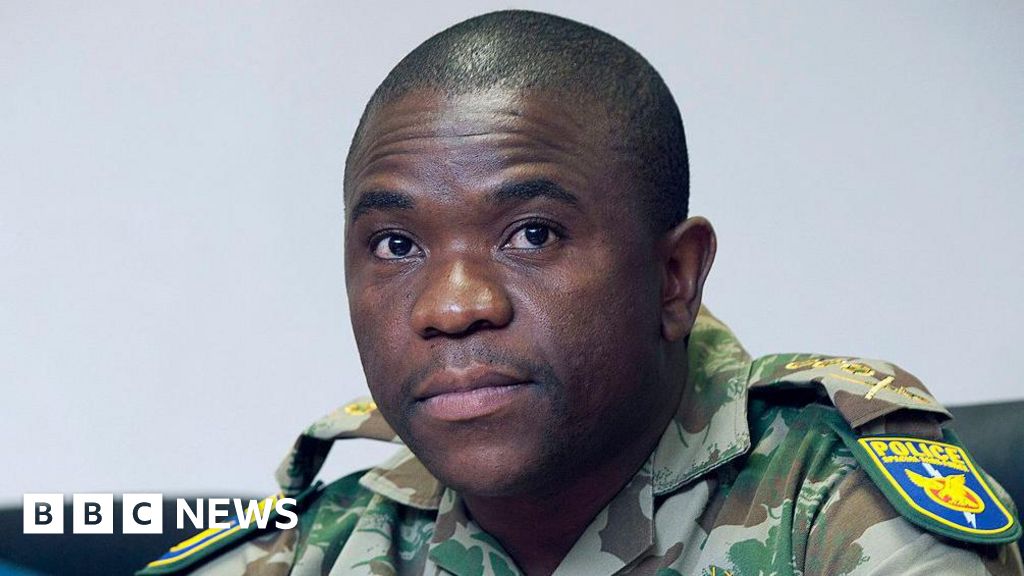BBC News, Johannesburg
 Gallo through getty image
Gallo through getty imageA highly respected police officer shook the government of South Africa – and has won many common people – with their explosive allegations that organized crime groups have entered the upper areas of the administration of President Cyril Ramposa.
General Nahlanhala Makhwanzi did it in a dramatic style – wearing clothes in a uniform -like uniform and surrounded by masked police officers, with automatic weapons, he called for a press conference to accuse Police Minister Senjo Machunu of having a relationship with criminal gangs.
He also said that his boss had closed an aristocratic unit investigating political murders after highlighting a drug cartel with the tent in the business sector, jail department, prosecution service and the judiciary.
“We’re on Combat Mode, I am directly taking criminals,” he announced, earlier this month in a broadcast broadcast Live on National TV.
South African is concerned about long -organized crime, which, prominent crime expert Dr. Johan Burger reported, “very serious level”.
One of the most notorious cases, South Africa’s longest serving police chief, Jackie Celebi, who was sentenced to 15 years in jail in 2010, was convicted of taking bribe from a Italian drug Lord, Glenn Aglooty, in exchange for a blindness for his criminal activity.
But General Makhwanzi’s intervention was unprecedented – first when a police officer publicly accused a cabinet member, alone accused the in -charge of the policing of joining criminal gangs.
The response was instantaneous. Machunu dismissed the allegations as a “wild and baseless” and said that he was “ready to respond to the allegations”, but the public rally around the police commissioner in General Makhwaji -Quazulu -Natal – despite Machunu being political turf.
#Handsoffnhlanhlamkhwanazi topped the government in a warning shot to not touch the 52 -year -old officer, topped the trend list on X.
“he is [seen as] A non-Bakwas person who carries the bull by horn, “Calvin Rafadi, a crime expert located in Johannesburg, University of South Africa, told the BBC.
 Gallow images through getty image
Gallow images through getty imageGeneral Makhwanzi first earned public praise about 15 years ago when in his ability as the acting police chief of South Africa, he suspended Crime Intelligence Boss Richard Madli, a close associate of the then President Jacob Zuma.
Later MDLuli was sentenced to five years in jail for kidnapping, attacking and threatening, reflecting the idea of General Makhwaji that he was a rotten apple within the police service.
General Makhwanzi faced heavy pressure to mold Maddaluli, assuming his political owners that only 38 years old officer at that time, “will be open to manipulation” [but] Dr. Burger said they were grossly wrong.
Not only did he carry forward with the suspension of MDLULI, he also made claims of political intervention during an attendance in Parliament.
While the move earned him a brownie points with the citizens, his public outbreak did not give him any favor and he was barely a year -old ax in the job and returned to ambiguity for many years.
 Gallo through getty image
Gallo through getty imageHe made a dramatic comeback in 2018 when he was appointed by the then police minister Bhaki Sela to the post of Provincial Police Head, with one of his major works to investigate the killings in the province, where competition for political power – and attractive states tenders – are fierce.
This would be the disintegration of this investigative unit by Mr. Machunu, due to which the explosive briefing of General Makhwaji took place a fortnight ago, complaining that 121 case dockets were “collecting dust” at the National Police Headquarters.
“I will die for this [police] Badge. I will not back down, “General Makhwanzi said, in line with his reputation of being a brave and selfless officer, which cannot be occupied by a corrupt political and professional elite.”
A survey by the Human Sciences Research Council (HSCRC) shows that public belief in the police is at the lower level of all time of 22%,
The police force has long been plagued by issues of political intervention, corruption and inability to effectively deal with high crime levels.
The crisis has also reached the upper structures of the force, with about 10 different police chiefs since 2000 – one has been convicted of corruption and the other is currently facing criminal allegations.
Gareth Newahm of Pretoria-based Institute for Security Studies (ISS) Think-Tank told BBC, “Gareth Newham said,” There are many mobility within the police service that need to be decided “.
But General Makhwaji’s tenure has not been without any dispute. He was a matter of investigation by police watchdog, after a complaint that he intervened in a criminal investigation in a senior jail officer.
However, he was approved for the allegation last month, with the opposition economic freedom fighters (EFFs), saying that the complaint was “designed to derail a committed officer who has been incredible in his fight against crime and corruption”.
The team of General Makhwanzi has also faced criticism for their heavy views to criminal suspects, who are sometimes shot in confrontation with officials under their command.
Mr. Nyhuham said that General Makhwani was seen as a “police police”, the public was ready to close an eye for the alleged abuses of their officers as “they want to be a hero in the police”.
Along with sending packing to Macchunu, there will be a new caretaker police minister in South Africa from next month – a law professor, a law professor who comes from a famous family of anti -apartheid activists, and served as Community Security Minister in Gauteng of South Africa from 2004 to 2009.
In an interview with the local TV station Newsroom Africa, Kachalia said that General Makhwaji’s decision to publicly go publicly with his explosive allegations was “extremely unusual”, but if they come true, we would be able to see in retrospects that what he did was completely appropriate “.
So General Makhwaji’s credibility is on the line – either he proves his allegations against Machunu or he can fall on his sword.
But now he has strengthened his reputation as a brave police officer, who took his political owners twice.
More BBC stories on South Africa:
 Getty Image/BBC
Getty Image/BBC
